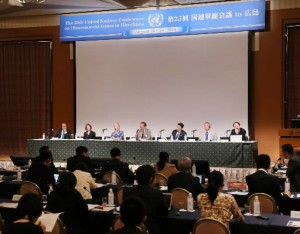U.N. Conference on Disarmament Issues proposes working group on abolishing nuclear weapons
Sep. 9, 2015
by Kyosuke Mizukawa, Staff Writer
On August 27, the second day of the U.N. Conference on Disarmament Issues, taking place in Hiroshima, discussions involved this past spring’s Review Conference of the Nuclear Non-proliferation Treaty (NPT) and four other topics, including future steps for nuclear disarmament. The participants suggested, in turn, that national governments pursue “effective measures,” including legal provisions, to advance the abolition of nuclear arms. They also proposed that the U.N. General Assembly establish a working group and that a summit meeting be held in the City of Hiroshima.
Exchanging views over the NPT Review Conference were Taous Feroukhi, who had served as the president of the conference, and six high government officials. Ms. Feroukhi currently serves as Councilor to the Ministry for Foreign Affairs of Algeria.
About the Review Conference, where the final document was rebuffed because some nations expressed objections over issues involving the Middle East, Ms. Feroukhi said that, though the final document was not adopted, concerns over the humanitarian impact of nuclear weapons were more keenly recognized. She mentioned the establishment of a working group under the U.N. General Assembly, as one future path, to consider “effective measures,” including a ban on nuclear weapons, which was a recommendation of the draft document.
Eliot Kang, Deputy Assistant Security for Nuclear Affairs of the United States, offered his cooperation, saying that dialogue between the nuclear weapon states and non-nuclear weapon states could be pursued as long as there was unanimous agreement on establishing the working group. Daryl Kimball, Executive Director of the Arms Control Association of the United States, proposed that a summit meeting for nuclear disarmament be held in Hiroshima in conjunction with the Group of Seven summit (Ise Shima summit) scheduled for May of next year. Mr. Kang said this would depend on Japan, but noted that the United States would give this idea careful consideration.
In the discussion involving the humanitarian impact of nuclear weapons, the participants from non-nuclear weapon states stressed the urgent need for legal provisions, citing the horrific damage caused by the atomic bombing of Hiroshima. Johann Kellerman, Director of the Disarmament & Non-Proliferation Department of International Relations and Cooperation of South Africa, said that it was the time to determine concrete measures and said that the non-nuclear weapon states could discuss legal options without the involvement of the nuclear powers. But an expert from France pointed out that more than a few non-nuclear states enjoy the benefits of deterrence provided by nuclear weapons.
Other subjects of discussion were a nuclear-weapon-free zone in Asia and efforts made with civil society to advance disarmament and non-proliferation education. The discussions concluded on August 27. On August 28, the last day of the conference, young people will report on their peace activities.
(Originally published on August 28, 2015)
On August 27, the second day of the U.N. Conference on Disarmament Issues, taking place in Hiroshima, discussions involved this past spring’s Review Conference of the Nuclear Non-proliferation Treaty (NPT) and four other topics, including future steps for nuclear disarmament. The participants suggested, in turn, that national governments pursue “effective measures,” including legal provisions, to advance the abolition of nuclear arms. They also proposed that the U.N. General Assembly establish a working group and that a summit meeting be held in the City of Hiroshima.
Exchanging views over the NPT Review Conference were Taous Feroukhi, who had served as the president of the conference, and six high government officials. Ms. Feroukhi currently serves as Councilor to the Ministry for Foreign Affairs of Algeria.
About the Review Conference, where the final document was rebuffed because some nations expressed objections over issues involving the Middle East, Ms. Feroukhi said that, though the final document was not adopted, concerns over the humanitarian impact of nuclear weapons were more keenly recognized. She mentioned the establishment of a working group under the U.N. General Assembly, as one future path, to consider “effective measures,” including a ban on nuclear weapons, which was a recommendation of the draft document.
Eliot Kang, Deputy Assistant Security for Nuclear Affairs of the United States, offered his cooperation, saying that dialogue between the nuclear weapon states and non-nuclear weapon states could be pursued as long as there was unanimous agreement on establishing the working group. Daryl Kimball, Executive Director of the Arms Control Association of the United States, proposed that a summit meeting for nuclear disarmament be held in Hiroshima in conjunction with the Group of Seven summit (Ise Shima summit) scheduled for May of next year. Mr. Kang said this would depend on Japan, but noted that the United States would give this idea careful consideration.
In the discussion involving the humanitarian impact of nuclear weapons, the participants from non-nuclear weapon states stressed the urgent need for legal provisions, citing the horrific damage caused by the atomic bombing of Hiroshima. Johann Kellerman, Director of the Disarmament & Non-Proliferation Department of International Relations and Cooperation of South Africa, said that it was the time to determine concrete measures and said that the non-nuclear weapon states could discuss legal options without the involvement of the nuclear powers. But an expert from France pointed out that more than a few non-nuclear states enjoy the benefits of deterrence provided by nuclear weapons.
Other subjects of discussion were a nuclear-weapon-free zone in Asia and efforts made with civil society to advance disarmament and non-proliferation education. The discussions concluded on August 27. On August 28, the last day of the conference, young people will report on their peace activities.
(Originally published on August 28, 2015)








